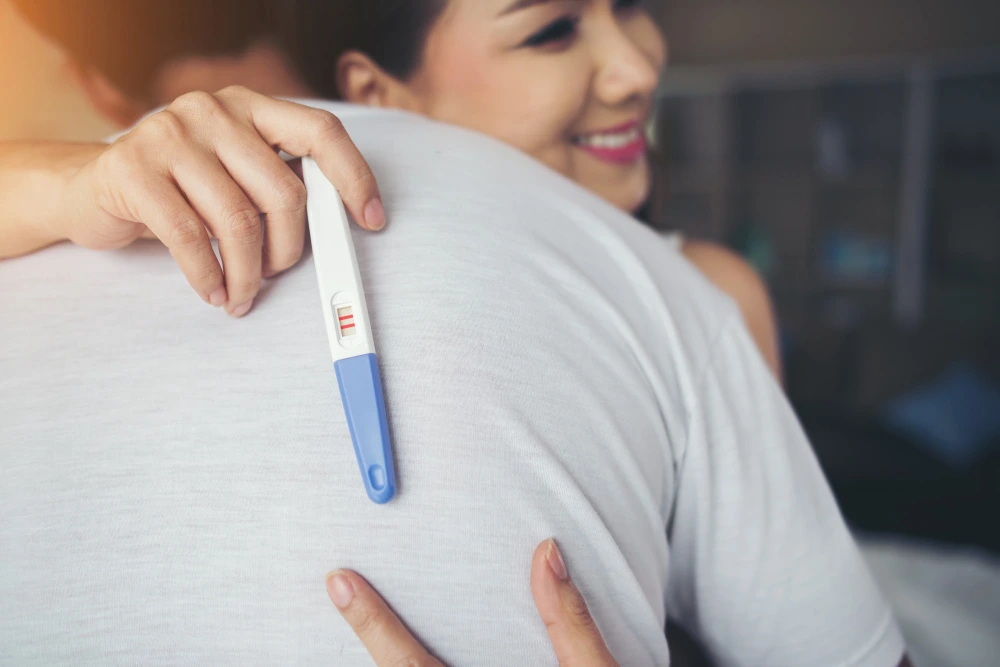In simple terms, ovulation tells your body when it’s time to get ready for pregnancy.
It’s the moment your ovary releases a mature egg, setting the stage for conception.
Whether you’re trying to conceive, avoiding pregnancy, or simply curious about your body’s reproductive health, this article will guide you through everything you need to know about this pivotal phase in the menstrual cycle.
The menstrual cycle
The menstrual cycle is a natural process that prepares the body for pregnancy each month. It lasts about 28 days, but can vary from woman to woman.
The cycle is divided into four phases:
- Menstrual phase (Days 1-5): The shedding of the uterine lining (your period)
- Follicular phase (Days 1-13): The body produces hormones to prepare the egg and uterus
- Ovulation (Around Day 14): A mature egg is released from the ovary
- Luteal phase (Days 15-28): The body prepares for a potential pregnancy
What is ovulation?
Ovulation, a critical phase in the menstrual cycle, is characterized by the release of a mature egg from the ovary. This signifies the body’s readiness for fertilization, which, if it occurs, can lead to pregnancy.
How does ovulation occur?
Ovulation is driven by a delicate hormonal balance. Two key hormones, estrogen and progesterone, regulate the different phases of your cycle, which prepares your body for pregnancy.
The critical moment that triggers ovulation is a sharp increase in luteinizing hormone (LH). This surge in LH signals the release of a mature egg from the ovary, marking your body’s most fertile time.
When does ovulation happen?
Ovulation timing isn’t a one-size-fits-all thing.
In general, ovulation it occurs about 14 days before the start of the next menstrual period. However, this timing can vary greatly among women and even from cycle to cycle for an individual.
Understanding this variability is crucial if you’re tracking ovulation for conception or monitoring your menstrual health.
Why is ovulation important for conception?
The egg can be fertilized by sperm within 12-24 hours after its release, making this window critical for natural conception. Additionally, understanding ovulation timing is vital for the timing of fertility treatments, as it pinpoints the period when the chances of pregnancy are highest.
Knowing this can help you make informed decisions about family planning and fertility management.
What are the signs of ovulation?
Ovulation signs differ from person to person, but recognizing these changes is important for understanding your fertility. Here are some of the most common signs to look out for:
- Cervical mucus change. During ovulation, cervical mucus becomes clearer and stretchier, resembling egg whites. This helps sperm travel more easily towards the egg.
- Basal body temperature (BBT) increase. After ovulation, your BBT typically rises by 0.5 to 1.0 degrees Fahrenheit. This signals that your body is preparing for potential conception.
- Mittelschmerz (Ovulation pain). Some women experience mild pelvic or abdominal pain, known as mittelschmerz, which can indicate the release of an egg.
Other possible signs include:
- Breast tenderness. Hormonal fluctuations may cause mild breast sensitivity.
- Increased libido. Many women notice a boost in sexual desire during their fertile window.

How can you track your ovulation?
If you’re aiming to conceive or monitor your menstrual health, tracking your ovulation can help in identifying your most fertile days with greater precision.
These methods include the following:
- Calendar method. Track the length of your menstrual cycles over several months to discern a pattern and accurately predict ovulation times.
- Ovulation predictor kits. These at-home tests offer a quick and reliable means to detect the critical surge in luteinizing hormone, which provides a clear signal of impending ovulation.
- Monitoring the body’s physical changes. Regularly tracking your basal body temperature and observing changes in cervical mucus can yield daily insights into your fertility status, since specific changes can indicate the ovulation phase.
What factors can affect ovulation?
Several factors can influence your ovulation, which can impact your menstrual cycle and fertility.
These include:
- Stress. High stress levels can cause a delay or stop ovulation altogether by upsetting the balance of hormones in the body.
- Being underweight. When you’re severely underweight, your body may not have enough fat to produce the necessary hormones, like estrogen, that help regulate the menstrual cycle. Low estrogen levels can lead to irregular or absent ovulation, making it harder to conceive.
- Being overweight. On the other hand, excess body fat can lead to higher levels of estrogen. While estrogen is necessary for ovulation, too much of it can disrupt the normal cycle. It can cause irregular periods or prevent ovulation altogether.
- Polycystic ovary syndrome (PCOS). PCOS is a condition that causes hormonal imbalances. This can often lead to irregular or absent ovulation, which makes it harder to get pregnant.
- Thyroid disorders. The thyroid gland regulates many body functions, including hormones that control ovulation. Both overactive and underactive thyroid conditions can impact ovulation.
Frequently asked questions
What is ovulation?
Ovulation refers to the phase in the menstrual cycle when an ovary releases an egg. This process is crucial for reproduction as it allows the egg to meet sperm for fertilization.
How do you know if you’re ovulating?
Signs of ovulation include a slight rise in basal body temperature, changes in cervical mucus, and possibly a brief twinge of pain or discomfort on one side of the abdomen.
What is the typical duration of the ovulation phase?
The ovulation phase is brief, typically lasting 24 to 48 hours. During this window, the egg remains viable for fertilization for about 12 to 24 hours after its release.
Can ovulation occur without a menstrual cycle?
Ovulation typically precedes menstruation, but in some cases, ovulation can occur without a subsequent menstrual period, especially in instances of hormonal imbalances or during perimenopause.
How does age affect ovulation?
As you age, particularly after the mid-30s, the frequency and regularity of ovulation may decrease, leading to challenges in conceiving due to reduced egg quality and quantity.
Key takeaway
Ovulation happens when the egg is released, and your body is ready for the possibility of pregnancy.
However, this process is not the same for everyone.
Learn more about your ovulation with our at-home tests here.




















































